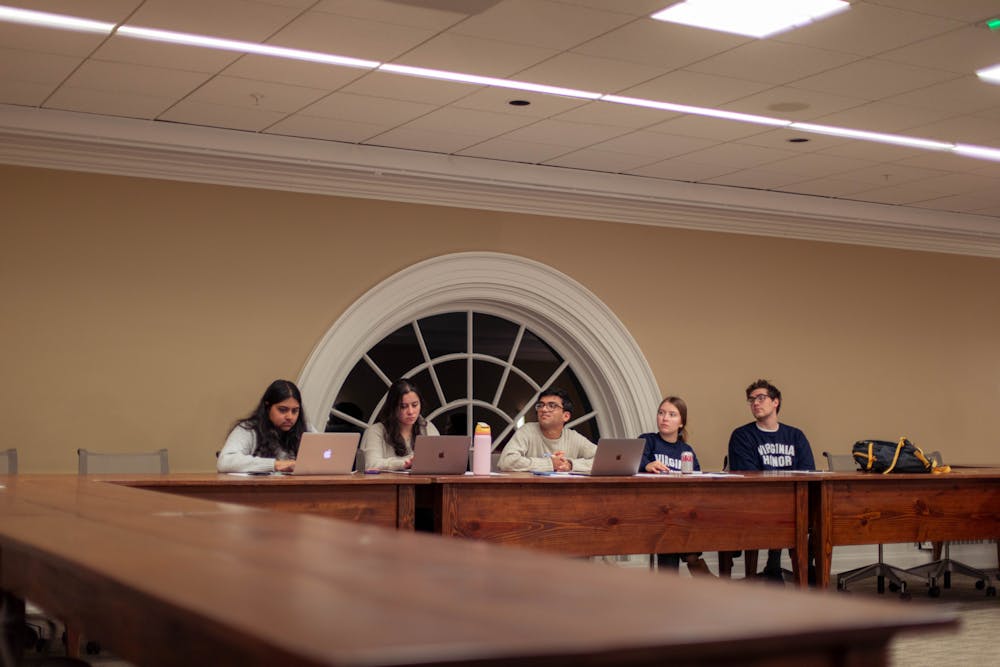The Honor Committee unanimously voted to approve changes to their bylaws at their meeting Sunday, entailing a transformation of the vice chair for treasury role and new descriptions of the Committee’s subcommittees. The Committee also debated options for revising the sanctions policy to use previous cases as precedent more often.
The vice chair for treasury position will officially become the vice chair for operations April 1, when the Committee's new bylaws go into effect.The vice chair for the treasury currently oversees and manages the Committee’s finances, but the new vice chair for operations position will have the added responsibility of organizing co-sponsorships — funding provided to student-led Contracted Independent Organizations to improve the relationship between the Committee and the student body and increase awareness of the Honor System. Before the bylaw amendment, co-sponsorships were managed by the vice chair for the graduate community.
Another additional responsibility for the vice chair for operations includes acting as a secretary for the Committee, in charge of record-keeping and note-taking at meetings, a job that was previously carried out by an appointed Committee member. The Committee outlined the full details of the role’s expansion in a new draft of its bylaws.
“Each Committee term, the Vice Chair for Operations shall assist the Chair in appropriating Honor Committee funds” the bylaws state. “In addition, the Vice Chair for Operations shall lead in coordinating and optimizing logistical functions of the Committee, while ensuring transparency through activities such as maintaining meeting minutes and other record-keeping as provided for in state law, University policy or Committee practice.”
Other new revisions to the bylaws now delineate the roles and objectives of the Committee's subcommittees, which are defined groups of students tasked with overseeing different functions of the Committee. The four standing subcommittees are the Community Relations and Diversity Advisory Committee, the Faculty Advisory Committee, the Policies & Procedures Committee and the Support Officer Selections & Recruitment Committee, with subcommittee leadership appointed by the chair. The bylaws now detail the structure and makeup of these committees, which were details absent in previous iterations.
After unanimously approving these changes, the Committee considered options for changing precedent policy, which was instituted alongside the creation of the panel for sanctions and the implementation of the multi-sanction system last year.
Precedent policy draws from past hearings and issued sanctions so that similar cases do not have conflicting outcomes. Currently, the bylaws grant the panel for sanctions — a group that assigns sanctions to students found to have violated the Honor Code — discretion to choose a sanction based on the distinct circumstances of each case, while also enabling the panel to consult de-identified public summaries of past cases as precedent.
The Committee debated options for changing precedent policy, such as expanding the information contained in public summaries — synopses of honor violations and issued sanctions designed to increase awareness and trust in the Honor System. This option would provide more thorough, past-case information for panelists to consider while deliberating sanctions, as opposed to the current situation which includes limited case details and the decided sanction, without any explanation.
Rachel Liesegang, vice chair for the undergraduate community and fourth-year College student, said that broadening explanations in public summaries of why certain sanctions were chosen could better guide panelists in making decisions, where more specific case details could allow for more comprehensive and accurate precedents.
Nishita Ghanate, vice chair for investigations and fourth-year College student, said she is skeptical about the prospective change and that using information as precedent beyond public summaries could raise concerns about maintaining case confidentiality.
“You’re really not entitled, as a committee member, to know anything about a case that you're not actually staffed on,” Ghanate said. “I would be hesitant to provide information that isn't necessarily public because of that.”
The policies and procedures subcommittee will continue to discuss precedent policy in their meetings, and the policy will remain an ongoing topic at Committee-wide meetings as well. The Committee will reconvene March 17 at 7:00 p.m.







